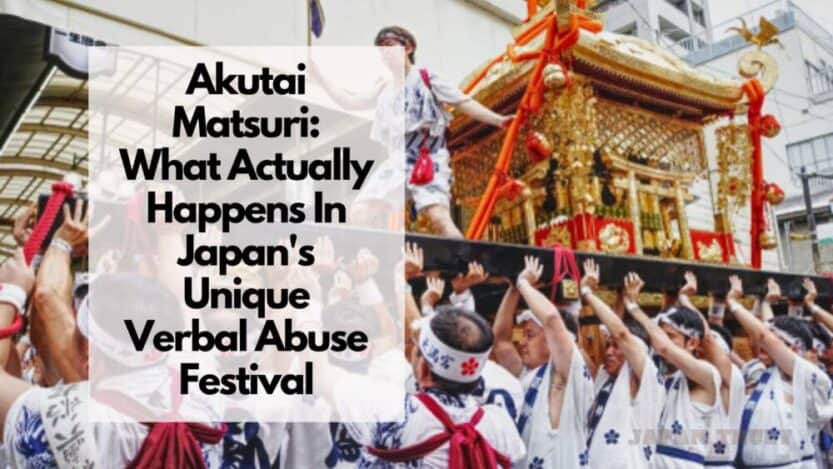I stumbled upon one of the most unconventional celebrations during my winter travels in Japan—the Akutai Matsuri. Commonly known in English as the “Verbal Abuse Festival,” this unique event unfolds in Kasama City, located in Ibaraki Prefecture.
Annually observed on the third Sunday of December, this festival goes against the grain of typical Japanese politeness.
Perched atop Mt. Atago, the Iitsuna Shrine becomes a stage for an extraordinary ceremony where locals embody roles far from their everyday courtesy.
I watched as they transformed into boisterous spectators, launching a barrage of classic insults, like “Bakayaro!” meaning “You idiots!” It’s a practice deeply rooted in history, dating back to the middle of the Edo period.
The Focus of the Festival:
- The ceremony commences with thirteen priests symbolizing the mythological tengu—long-nosed spirits of the mountains.
- Starting from Atago Shrine, the procession winds towards the “Atago Tengu Forest,” involving numerous shrine stops.
While making their ascent up Mt. Atago, the priests receive a less-than-holy welcome. “Osoi zo!” and “Hayaku agare yo, kono yaro!” – “You’re so slow!” and “Climb faster, you bastards!” – echo from the crowd, aimed at the robed figures. It’s this unrestrained exchange that forms the heart of the Akutai Matsuri.
Tradition With a Twist:
- Locals compete to snatch the priests’ offerings, which are believed to be bearers of good fortune, but only after the prayers are complete.
- The priests wield a green bamboo rod—a symbol of their authority to enforce this tradition, ensuring the participants abide by the rules.
The festival’s rulebook, well-respected among attendees, also caps the fervor: no using personal names in barbs.
That said, the air is thick with excitement, as participants, both locals and tourists, vent their frustrations through a volley of creative cries.
At the end of the procession, priests don tengu masks and toss snacks and rice cakes to the crowd, rewarding their participation.
And just when I thought I had witnessed it all, the concluding ritual had everyone shouting “Bakayaro!” thrice, in unison—a cathartic finale to a most unorthodox festival.
Despite all the unruly behavior, I sensed a spirit of camaraderie and light-heartedness.
Calling it a day, I realized how this peculiar tradition not only served as a stress reliever but also offered a glimpse into a lesser-known facet of Japanese culture that could easily be missed if one sticks only to the conventional tourist paths.
If you ever find yourself in Japan during December, a side trip to Ibaraki might just give you the most memorable festival experience you could imagine.
What Happens at Japan’s Notorious Festival of Swearing?
At the Akutai Matsuri, you’ll find a unique celebration where shouting and swearing aren’t just allowed – they’re encouraged. Participants unleash a barrage of words usually frowned upon, targeting the figures dressed as tengu, the legendary creatures from Japanese folklore.
Is the Festival of Insults in Japan Open to Everyone?
Yes, this event doesn’t discriminate – anyone eager to let off some steam through creative verbal expression is welcome to join. Whether you’re local or a visitor, the festival is an open space for all to engage in the unusual tradition.
What’s the Historical Significance Behind The Festival Dedicated to Cussing?
The festival has deep roots, tracing back to a tradition where verbalizing curses was believed to exorcise bad luck and reinforce bonds within the community. It served as a catharsis, ensuring peace by airing grievances in a controlled environment.
How Do People Feel About the Insults Hurled at Akutai Matsuri?
Interestingly, everyone’s in high spirits. Tourists and locals alike understand that the off-color remarks are all in good fun, part of a cultural ritual that’s more about festivity than hostility.
Are There Special Insults Reserved for the Akutai Festival?
Participants at the Akutai Festival don’t hold back and use a variety of phrases, but they often stick to traditional insults that have become associated with the festival over the years. The art is in the delivery, not just the words themselves.
When Should I Plan My Trip to Witness the Swearing Spectacle?
Get ready for winter travel; the festival hits its peak in December. If you’re looking to witness or take part in this tradition, plan your visit to coincide with the third Sunday of December, when the festivities reach their height.
My writing focuses on the various aspects of Japanese lifestyle, from traditional tea ceremonies and flower arrangement to modern fashion trends and pop culture. Through my articles, I aim to share my passion for Japan and provide readers with a glimpse into the rich and diverse world of Japanese culture.
I believe that the key to understanding Japanese lifestyle is to appreciate the balance between tradition and innovation. While Japan has a rich cultural heritage that dates back centuries, it is also a country that is constantly evolving and embracing new ideas and technologies.
Whether you’re interested in learning about the latest fashion trends in Tokyo, or want to explore the ancient art of calligraphy, my writing will take you on a journey through the many facets of Japanese lifestyle. So join me as we explore the beauty and complexity of this fascinating culture together!






